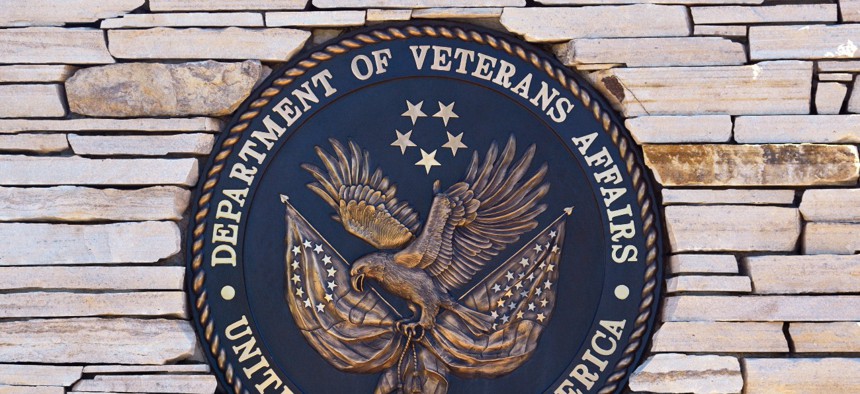
Robert Alexander/Getty Images
As Turnover Soars, Most VA Employees Say They Were Not Emotionally Supported During the Pandemic
Front-line staff were largely unaware of VA's offerings to support employee well-being, new survey finds.
Front-line employees at the Veterans Affairs Department are reporting high levels of stress and limited assistance to deal with their mental health, according to a new survey by the agency’s inspector general, contributing to VA's record-high turnover.
While VA took several steps since the outset of the COVID-19 pandemic to address employee well-being, the workforce remained largely unaware of those efforts. Regional and facility leadership overwhelmingly reported to the IG that they knew about the department’s steps to address employees’ mental health needs, but that largely did not trickle down to the clinical staff. Just 40% of the health care staff knew about efforts to provide emotional support resources.
Middle management similarly appeared unaware of the resources made available for them. Just 12% of “service-line leadership” said they knew about the “rapid response consultations” VA offered during the pandemic to provide assistance to the supervisors for leading in a virtual environment and meeting employee support needs.
Just 38% of clinical staff said management was responsive to their concerns during the pandemic. A slight majority of those workers said VA was not adequately providing emotional support. The IG received responses from more than 8,000 employees for its survey.
From its initial COVID-19 response plan, VA recognized it would need to account for employee “recovery” and set out to provide additional mental health services for staff. The department's National Center for Organizational Development led the effort, though several offices—such as its chaplain service and the Office of Mental Health and Suicide Prevention—were also involved. VA installed employee support teams at facilities, solicited employee reflection videos, launched webinars on self-care and established a “wall of honor” for employees who died from COVID-19. Those who engaged with VA’s offerings generally found them to be helpful, the IG found.
“Greater awareness and encouragement could lead to increased utilization of resources, a better sense of facility support for employees experiencing distress, and improved organizational resilience,” the auditors said.
VA conducted its own survey in December, frontline staff “exhibited a diminished capacity to deal with the stresses and demands of the work environment.” About one-in-five workers said they were experiencing more burnout than usual and one-in-four said they felt high or extreme levels of stress from the pandemic. Overly stressed employees frequently engaged in “interpersonal challenges and conflict,” VA said.
In November, VA launched its Reducing Employee Burnout and Optimizing Organizational Thriving (REBOOT) Task Force to help improve worker well-being and reduce turnover. In response to the IG’s findings, VA said the task force is already working on addressing the issues identified in the report and is focused on “supporting the individual resilience of employees.”
“The VHA recognized in the second half of FY21 that there needed to be a more strategic approach to supporting employees that addressed not just the employee well-being factors connected with burnout, but also the organizational design factors that are major contributors to burnout as well,” VA said.
In a speech in February, VA Secretary Denis McDonough acknowledged that VA was losing employees to burnout and announced 10 steps to better reward the workforce. Those included upping retention bonuses and lifting the caps on some employees' pay. VA is currently experiencing its worst turnover rate in 15 years, and is anticipating needing to hire 15,000 nurses per year for the next five years.
“You’ve had to cover for thousands of colleagues who were sick and unable to work, meaning even longer hours and later nights,” the secretary said.
VA employees have since the outset of the pandemic complained of dire and, at times, unsafe working conditions, though most have acknowledged things have largely improved since those first months. Still, many facilities experienced staffing shortages, especially as new waves of the pandemic forced thousands of employees to miss work at any given time. VA said its task force is currently soliciting and evaluating recommendations and hopes to implement changes by December.
“The VHA knows that burnout is an imperative organizational issue,” the department said, “and is committed to implementing actions to address system stressors that contribute to burnout as well as promoting initiatives that foster joy and wellbeing in the workplace.”







